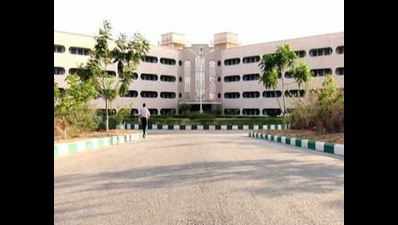- News
- City News
- Hyderabad News
- IIIT researchers simplify cancer diagnosis, prognosis
Trending
This story is from September 25, 2019
IIIT researchers simplify cancer diagnosis, prognosis

IIIT Hyderabad
HYDERABAD: Researchers at International Institute of Information Technology Hyderabad (IIIT Hyderabad) have developed an automatic system for cancer diagnosis and prognosis.
The deep learning networks automatically classify subtypes of renal cancer and predict patient survival outcome from digital histopathological images.
“The model achieved over 90% accuracy in determining whether the histopathological images are tumour or not, and 94% accuracy in determining the subtypes of cancer,” said Vinod PK from Computational Natural Sciences and Bioinformatics, IIIT Hyderabad adding that the model could also generate a risk index based on tumour shape thereby predicting patient survival outcomes.
Researchers said that cancer diagnosis is typically arrived at by first looking at reports of CT Scan or an MRI, followed by a biopsy.
He said that the manual microscopic analysis takes a considerable amount of effort and time and in cancer outcomes, timely detection and diagnosis is paramount. The machine can also step in where there are differing opinions among pathologists and could help in resolving issues by aiding, but not replacing the pathologist, he added.
The digital histopathological images for the study were obtained from the Cancer Genome Atlas Project funded by the US Government, which has catalogued and characterized 33 different types of cancers using genome sequencing.
The IIIT Hyderabad research team now plans on expanding the scope of research by working with Indian cancer data sets, beginning with lung cancer which is most prevalent in the country today. In the Indian context, the researcher said that this is a bit more challenging as the digital images of tissue samples are simply not available.
The team is in talks with pathologists of various hospitals in the city to popularize scanning and digitizing microscopic slides.
The deep learning networks automatically classify subtypes of renal cancer and predict patient survival outcome from digital histopathological images.
“The model achieved over 90% accuracy in determining whether the histopathological images are tumour or not, and 94% accuracy in determining the subtypes of cancer,” said Vinod PK from Computational Natural Sciences and Bioinformatics, IIIT Hyderabad adding that the model could also generate a risk index based on tumour shape thereby predicting patient survival outcomes.
Researchers said that cancer diagnosis is typically arrived at by first looking at reports of CT Scan or an MRI, followed by a biopsy.
“The aim was to see how a computer can interpret those images that can have diagnostic and predictive values. However, analysis of these histopathological images is something we hadn’t done before and hence we collaborated with the Centre for Visual Information Technology,” said Vinod adding that they focused on kidney cancer because it is among the most common cancer in both, men and woman.
He said that the manual microscopic analysis takes a considerable amount of effort and time and in cancer outcomes, timely detection and diagnosis is paramount. The machine can also step in where there are differing opinions among pathologists and could help in resolving issues by aiding, but not replacing the pathologist, he added.
The digital histopathological images for the study were obtained from the Cancer Genome Atlas Project funded by the US Government, which has catalogued and characterized 33 different types of cancers using genome sequencing.
The IIIT Hyderabad research team now plans on expanding the scope of research by working with Indian cancer data sets, beginning with lung cancer which is most prevalent in the country today. In the Indian context, the researcher said that this is a bit more challenging as the digital images of tissue samples are simply not available.
The team is in talks with pathologists of various hospitals in the city to popularize scanning and digitizing microscopic slides.
End of Article
FOLLOW US ON SOCIAL MEDIA










